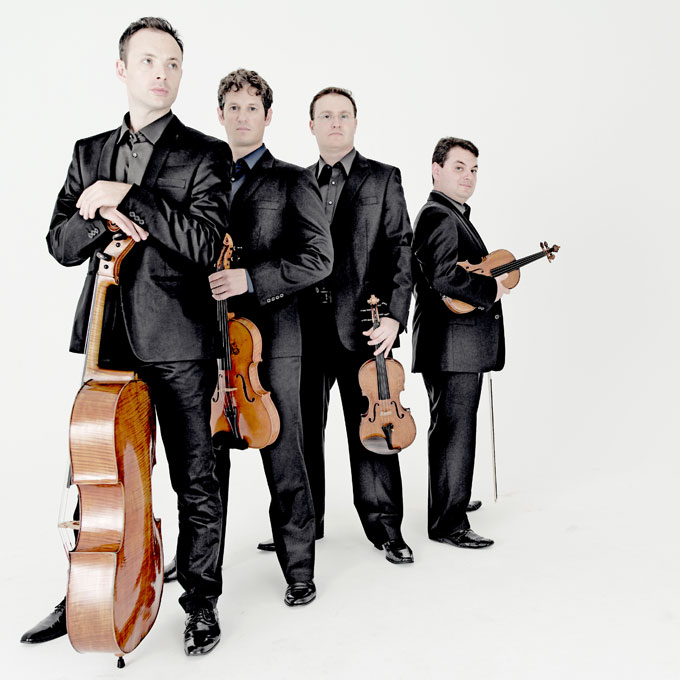Next story: Farm dinners reunite consumers with the land
Chamber Music for Three and Four
by Jan Jezioro

The Horszowski Trio and the Jerusalem Quartet
The Horszowski Trio will open the Slee/Visiting Artists series on Friday at 7:30pm at Slee Hall on the UB Amherst Campus while the Jerusalem Quartet opens the Buffalo Chamber Music Society’s season on Tuesday in the Mary Seaton Room of Kleinhans Music Hall
The Horszowski Trio
Jesse Mills, a two-time Grammy nominated violinist, joined with cellist Raman Ramakrishnan, a former founding member of the Daedalus Quartet, which had won the grand prize at the 2001 Banff International String Quartet Competition, and pianist Rieko Aizawa, to form the Horszowski Trio in 2011. The members of the Horszowski Trio had previously performed together, one way or another, for quite a while. Mills played with Ramakrishnan at the very beginning of their musical studies at the Kinhaven Music School over twenty years before they decided to form their trio. They met pianist Rieko Aizawa in New York City, where she had been discovered by Alexander Schneider the second violinist of the now legendary Budapest String Quartet. The close friendship of Aizawa, Mills and Ramakrishnan created the kind of deep trust that allows exhilarating expressive freedom.
Rieko Aizawa was the last pupil of the legendary Polish-born American pianist Mieczysław Horszowski (1892-1993) at the Curtis Institute, and the trio takes their inspiration, as well as their name, from Horszowski’s musicianship, integrity, and humanity. Some members of the audience on Friday will no doubt recall an earlier, unforgettable evening of music making at Slee Hall by Horszowski, who had one of the longest careers in the history of classical music, back in the late 1980’s. Horszowski, who had just married for the first time at the age of 89, displayed a never to be forgotten sensitivity in his playing that was influenced by both his mother, his first teacher, who had studied under a pupil of Chopin, and his teacher Theodor Leschetizky, who had studied under Beethoven’s pupil, Carl Czerny, demonstrating the continuation of an artistic lineage that cannot be repeated.
The program begins with the Trio in C Major, Hob. XV:27 by Josef Haydn, the prolific, first master of the classical piano trio form, and concludes with the robustly Romantic Trio No. 1 in D minor, Op. 63 (1847) by Robert Schumann. Sandwiched between these two works is the Fremde Szenen II (1982-4), one of a set of three piano trios by Wolfgang Rihm, one of Europe’s leading contemporary composers, inspired by Schumann. According to Oxford University’s Music and Letters journal, the Rihm trios “engage the swaying fluidity of Schumann’s musical sensibility as a memory and as a direct presence. By combining a nineteenth-century notion of inner emotion with an inter-textual model of subjectivity, these pieces fruitfully bring into contact two differing notions of self. Moreover, they enact ways of simultaneously inhabiting and transforming historical material, without drawing a rigid boundary between these states.”
Tickets: $15/10; free for UB students. Information: slee.buffalo.edu.
The Jerusalem Quartet
Is the Jerusalem Quartet the finest string quartet now performing in the world? The avid local chamber music audience will once again enjoy the opportunity to ponder that question when the 91st season of the Buffalo Chamber Music Society opens on Tuesday, October 14 at 8pm in the Mary Seaton Room with a performance by the Jerusalem Quartet. The group’s two previous appearances on this series in 2005 and 2012 set a standard that all subsequent visiting string quartets have had to match. The Jerusalem Quartet was awarded the outstanding Chamber Music Award by the prestigious BBC Music Magazine an unprecedented three times, most recently for their CD of Mozart quartets in 2012, as well as for their recordings of Haydn in 2010 and Shostakovich in 2007.
Their program includes Beethoven’s early Quartet in A Major, Op.18, No. 5, a work very familiar to Buffalo audiences through its yearly appearances on the annual Slee Beethoven Cycle.
There was an unexpected, but hugely gratifying audience at last Wednesday’s BPO premiere of the concert stage version of Béla Bartók’s opera, Bluebeard’s Castle due, no doubt at least in part, to the spectacular staging highlighted by the huge, fantastical glass sculptures of Dale Chihuly. One can only hope that the Jerusalem Quartet’s performance of Bartók’s String Quartet No. 2, composed towards the end of World War I, will intrigue at least some members of that large audience to attend this event.
The final quartet on the program is genuinely irresistible. Maurice Ravel composed his Quartet in F Major, his sole effort in the string quartet genre, as his final prize entry as a student at the Paris Conservatory for the highly coveted Prix de Rome, but the work was rejected. It is safe to predict, however, that everyone in Tuesday’s audience will disagree with that decision.
Tickets: $20/$10; free admission for Middle/High School students. Information: bflochambermusic.org
blog comments powered by Disqus|
Issue Navigation> Issue Index > v13n41 (Week of Thursday, October 9) > Chamber Music for Three and Four This Week's Issue • Artvoice Daily • Artvoice TV • Events Calendar • Classifieds |









 Current Issue
Current Issue